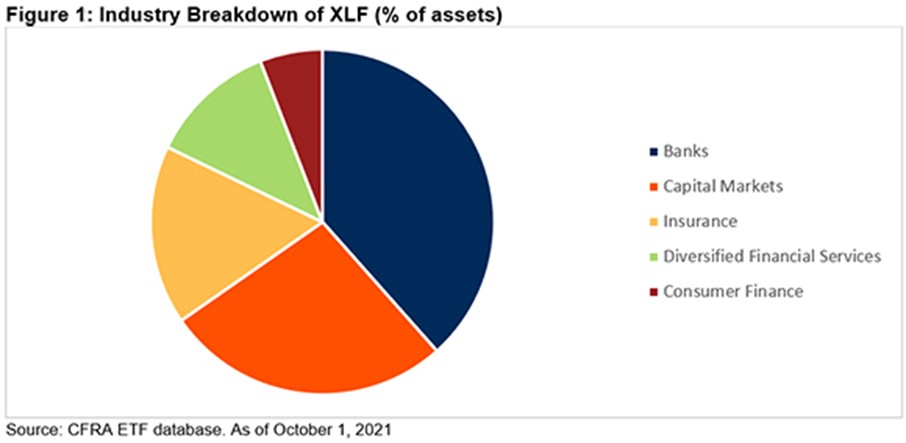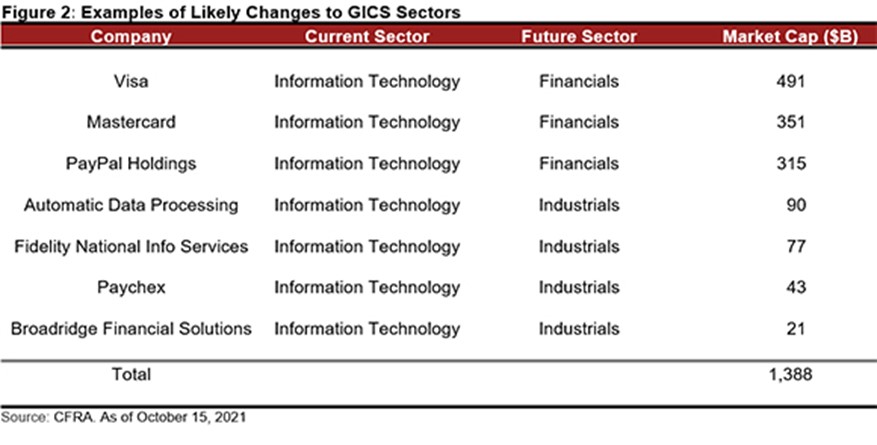Some of the largest information technology companies in the S&P 500 index could be changing sectors in early 2022. S&P Dow Jones Indices (SPDJI), together with MSCI, have co-developed the Global Industry Classification Standard (GICS) as a structure for classifying companies into sectors, industries and subindustries across global benchmarks.
Periodically, the index providers consult with the investment community in advance of making significant changes, such as when they carved out real estate as the eleventh sector or moved companies like Alphabet and Facebook from information technology and Comcast and Netflix into the same renamed communications services sector as AT&T and Verizon.
A new GICS consultation just got underway that involves potential changes within many of the sectors, but to us, there is one major one that involves companies shifting from the information technology sector to either financials or industrials. We expect the changes to occur in 2022.
The largest US-listed sector ETFs track either an SPDJI or MSCI index. Led by the $51bn MSCI-based Vanguard Information Technology ETF (VGT) and $45bn SPDJI-based Technology Select Sector SPDR Fund (XLK), there is more than $100bn in ETF assets that hold only the stocks inside a GICS-based information technology index, according to data from CFRA.
While there are no plans to shift Apple and Microsoft, at least seven of the sector’s large-cap constituents are potentially moving to a new sector. These companies are all currently in the data processing and outsourced services subindustry.
According to the GICS consultation document, many of these companies support activities that are closely aligned with the business support activities covered under the industrials sector rather than the information technology sector, or with the financials sector, in the case of payment processors.
Digging into the changes
Under the proposed changes, Mastercard, PayPal and Visa would move to the financials sector as part of the newly created transaction and payment processing services subindustry, and finally be in the same sector as consumer finance companies American Express and Capital One Financial.
Mastercard, PayPal and Visa recently represented a combined 9.6% of American Express’s assets according to CFRA, and their removal from the tech sector is likely to result in increased exposure for the ETF to Adobe, Cisco Systems, Intel and salesforce.com as well as other more moderately sized tech stocks.
Separately, Automatic Data Processing and Financial National Information Services and Paychex would move to the human resources and employment services subindustry, while Broadridge Financial and Financial National Information Services would remain classified as data processing and outsourced services companies. All four would shift to the industrials sector from information technology.
These changes would impact VGT and XLK as well as the Fidelity MSCI Information Technology ETF (FTEC) and the Invesco S&P 500 Equal Weight Technology ETF (RYT), though in different ways. RYT owns roughly the same amount of assets in Paychex as Visa, unlike its market-cap-weighted ETF peers.
Banks would no longer dominate broad financial ETFs. At 38% of assets for the $45bn Financial Select Sector SPDR Fund (XLF), banks are easily the sector ETF’s largest industry group, but would change if Visa, PayPal and Microsoft are moved as planned into the sector. With a recent market capitalisation of $490bn, Visa would be similarly sized as JP Morgan, XLF’s second-largest position, with an 11% weighting.
Meanwhile, Microsoft and PayPal, when combined, are bigger than Bank of America and Wells Fargo and would be poised to be in the top five positions in XLF. Their addition would likely result in XLF and other broad financial sector ETFs paring stakes in American Express, Citigroup and Morgan Stanley. The Vanguard Financials ETF (VFH) and the Fidelity MSCI Financials Index ETF (FNCL) would also make changes to their holdings, as they track MSCI indices.

The pending impact to industrials ETFs will be relatively muted but noteworthy. If Automatic Data Processing and FIS were currently classified as industrial companies, they would be the eleventh and thirteenth largest positions in Industrial Select Sector SPDR Fund (XLI), respectively, just ahead of and behind CSX Corporation.
XLI and peer Vanguard Industrials ETF (VIS) are relatively diversified across industries, with industrials conglomerate Honeywell, road and rail company Union Pacific, air freight and logistics firm United Postal Service, and aerospace and defence company Raytheon Technologies as the top positions.
The addition of current information technology stocks would provide some additional diversification for cap-weighted industrials ETFs, but we think the impact would be less than it would for financials.

Conclusion
We believe a fund’s prospects are driven in part based on the reward and risks of its holdings, but that’s particularly relevant when the stocks inside a fund in 2022 should look very different than what has been there the last three years.
Assuming the proposed GICS changes occur as planned, we will subsequently focus on what ends up part of the portfolio.
Todd Rosenbluth is head of ETF and mutual fund research at CFRA
This story was originally published onETF.com




